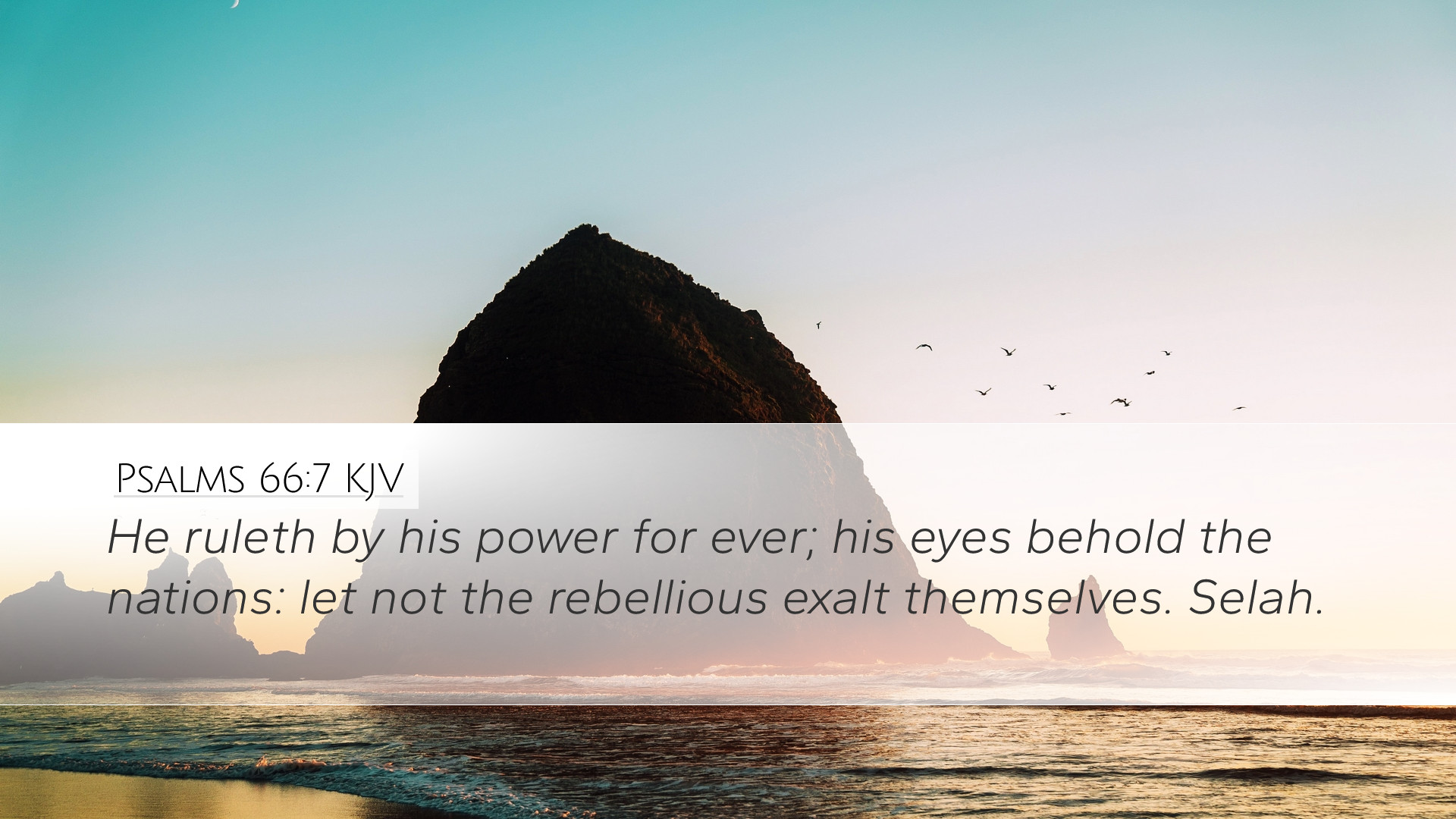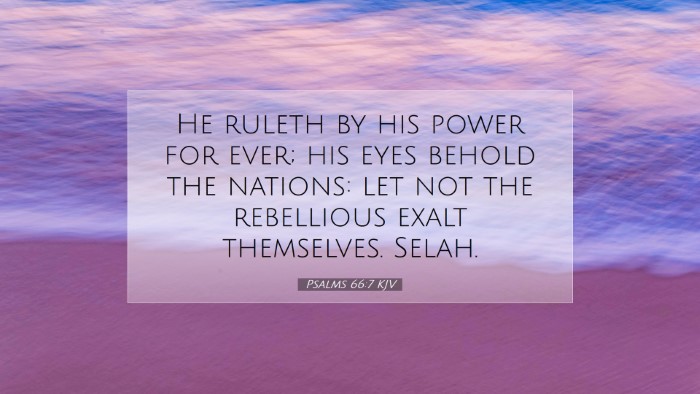Commentary on Psalms 66:7
Bible Verse: Psalms 66:7: "He rules by his power forever; his eyes behold the nations: let not the rebellious exalt themselves." Selah.
Exegesis and Background
The Psalms, often referred to as the hymnal of ancient Israel, encapsulates the spiritual journey of God’s people. Psalm 66 is particularly significant because it combines elements of praise, reflection on God's deeds, and a heartfelt supplication. The verse 66:7 presents a powerful assertion regarding the sovereignty of God and His unwavering authority over the nations. The verse can be understood in a threefold context: the divine sovereignty, the observation of humanity, and a solemn warning to those who resist God's authority.
Insights from Matthew Henry
Matthew Henry emphasizes the omnipotence of God as the ultimate ruler over all creation. He notes that God's might is everlasting, which serves as a source of comfort for the faithful. In his commentary, Henry asserts:
"This passage reflects the extent of God's power, which is not only constant but reaches into the affairs of nations. The acknowledgment of God’s rule is essential, for it serves to remind us that human rebelling against divine authority is futile."
Henry’s observations point to the assurance found in God’s everlasting governance—a poignant reminder for believers to trust in God's plans even amidst turmoil.
Insights from Albert Barnes
Albert Barnes approaches the verse with a focus on the implications of divine sovereignty over humanity, particularly the nations. In his commentary, Barnes interprets the latter part of the verse—"let not the rebellious exalt themselves"—as a caution against pride and rebellion:
"No matter how powerful the nations may think themselves to be, they are ultimately subject to the authority of God. The rebellious who rise against God do so at their own peril, as history has shown the fate of those who defy the Lord."
His reflections call attention to the historical instances where nations fell due to their defiance against divine principles. Barnes reminds readers that the exaltation of the wicked is temporary and will always lead to a reckoning.
Insights from Adam Clarke
Adam Clarke provides a nuanced view in understanding the term "rebellious." He suggests that the rebellious may refer not just to wicked individuals, but also to entire nations that turn their backs on God's statutes. Clarke notes:
"The rebellion mentioned here is not merely an act of individual sin but a collective state of defiance against the Lord. Such exaltation, be it political or social, stands in contradiction to God’s eternal reign."
Clarke argues for the importance of recognizing one's position under God's authority, urging that both individuals and nations must reflect on their conduct in light of divine expectations. The use of “Selah” at the end serves as a moment for contemplation about this divine governance.
Theological Implications
The theological implications of Psalms 66:7 are profound and multifaceted. This verse serves as a reminder for believers that:
- God’s Sovereignty: God reigns supreme, overseeing all nations and ensuring that His will is ultimately fulfilled.
- The Reckoning of the Wicked: The state of rebellion against God is marked by inevitable consequences and divine judgment.
- Call to Humility: Believers are reminded to humble themselves under God’s mighty hand and recognize His control over human affairs.
Pastors and theologians can utilize these insights in teaching and preaching, emphasizing the importance of aligning with God’s will rather than seeking self-aggrandizement in rebellion.
Applications for Today
In today’s context, Psalms 66:7 challenges both individuals and nations to reflect on their relationship with God:
- For Individuals: Believers are called to examine personal attitudes of rebellion—be it through pride, disobedience, or a lack of submission to God's will.
- For Nations: Countries should reflect on their policies and actions that may stand in opposition to God’s designs for justice, mercy, and peace.
- For the Church: The church is urged to promote humility, repentance, and a collaborative approach to align with God's purposes in the world.
This verse encapsulates a timeless truth: the importance of recognition of God’s authority and the dire consequences of rebellion against His righteous governance.
Closing Reflections
In conclusion, Psalms 66:7 serves as both a declaration of God’s omnipotence and a warning to those who choose to defy His authority. As pastors, students, and theologians engage with this text, they are invited to ponder God’s unyielding rule, the inevitable downfall of the rebellious, and the invitation to partake in a lifestyle of submission and reverence toward the King of kings. The call to reflection—marked by the Selah—encourages a deeper contemplation on these spiritual truths.


